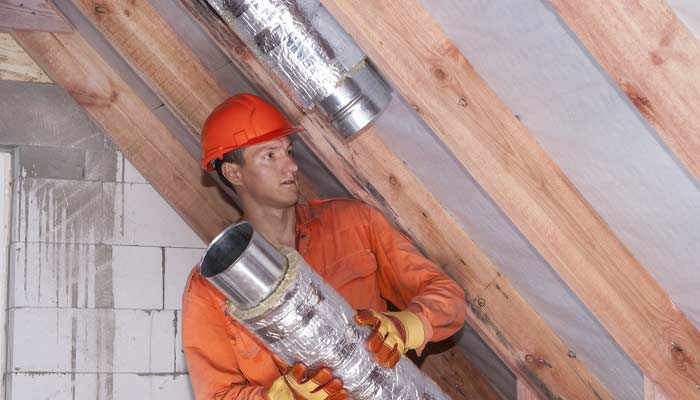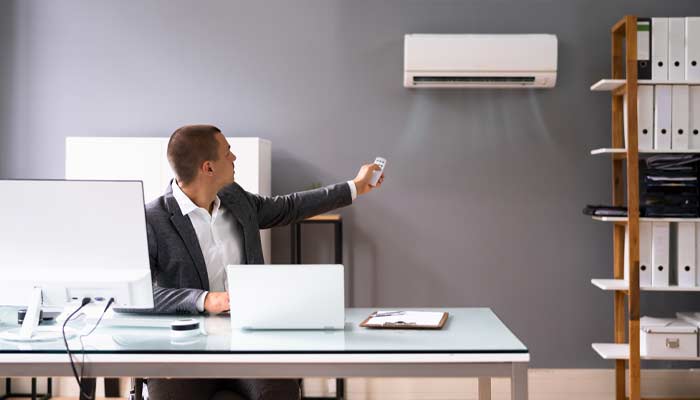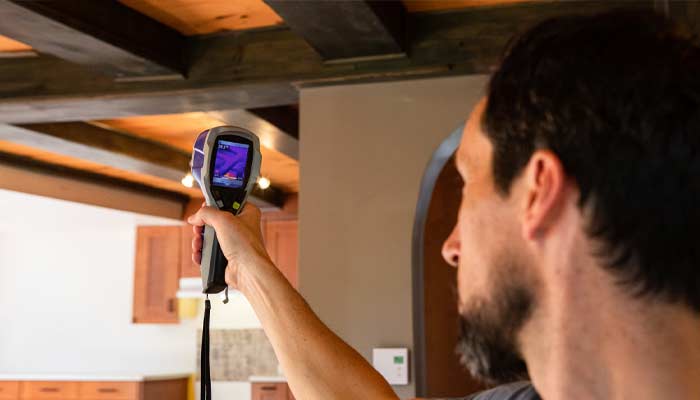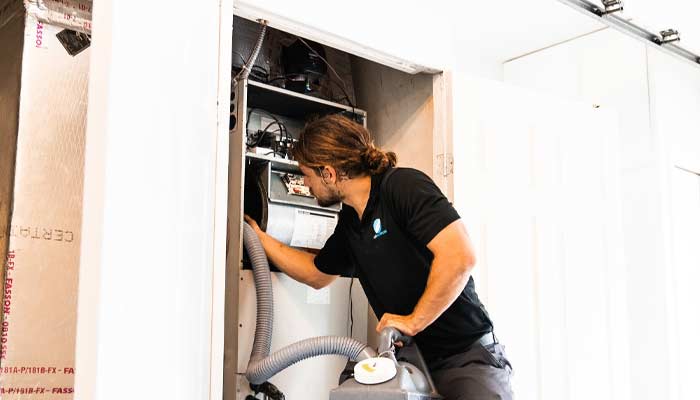When your HVAC unit stops working, determining if you need to replace it might be challenging. In certain circumstances, the cost of replacing outweighs the cost of restoring the old one. If you’re unclear about what to do, here are some pointers to consider when determining whether to replace your unit and how much it would cost. Remember that these are only estimates and will vary based on the size of your home, the type and model of the unit, and other considerations.
Once its replaced make sure you keep them clean! Click here to find out why.
Thinking about replacing your HVAC system?
You’re not alone. Air Mavericks can assist you at every stage, from selecting the best system for your home to installation and after-sales service. We provide a wide range of products, and our specialists are always available to assist.
Replacing your HVAC system might be a significant choice, but it doesn’t have to be complex with Air Mavericks. We’ll take care of everything so you can sit back and enjoy your new system. In addition, we provide financing alternatives so you may receive the system you need without breaking the bank.
Contact us today for a free consultation!
What are HVAC Systems?
HVAC involves using numerous technologies to regulate the temperature, humidity, and purity of air in a building. Its objective is to provide thermal comfort and adequate indoor air quality.
HVAC Units use a variety of energy sources, including natural gas, electricity, oil, coal, and solar power. HVAC systems can use water-cooled chillers instead of air-cooled condensers in commercial and industrial applications.
The three primary functions of an HVAC system are:
Heating – The process of transferring heat from one place to another.
Ventilation – The process of moving air into and out of an enclosed space.
Air Conditioning – The process of removing heat and moisture from the air.
How much does the replacement of an HVAC system cost?
A heating or cooling system keeps your house pleasant and comfortable by cycling fresh air through a network of ducts, filters, and coils. Combined, these components can adjust your house’s temperature and humidity. The average cost of replacing a whole HVAC system isn’t easy to quote just one price, as there are variables that are involved.
The cost of replacing an HVAC system depends on several factors, including the size of your property, the type of unit required, and the make and model of the unit.
Factors in Calculating HVAC Replacement Cost
The average HVAC replacement cost will depend on several things. Due to the cost of the new HVAC unit, labor costs, installation, accessibility, removal and disposal costs for the old HVAC unit, climate, and the age and condition of the home, prices may vary from the national average.
New HVAC System Cost
New HVAC systems can range in price, depending on the kind and size of the AC unit. Something to note is that while a newer, more energy-efficient model can be more expensive initially, it can result in long-term energy cost reductions.
Labor
The labor cost typically varies and is included in the installation price. Replacing an old HVAC system with a new one might take anywhere from 6 to 10 hours, depending on its size and complexity. If new ducting is necessary, the installation may be delayed.
HVAC Installation and Accessory
An HVAC unit may be installed in three ways: as part of a change-out that includes a new heating and cooling system; as part of a complete installation that includes all HVAC equipment and ductwork; and as part of a full install that includes a zoning system and any other added features. The cost of upgrading the outdated HVAC system will increase as access becomes more difficult.
Removal and Disposal
In most cases, the cost of removal and disposal of the old HVAC unit is included in the replacement cost. Always inquire about the cost of removal and disposal from the HVAC specialist performing your replacement.
Some Additional Costs and Considerations
There are other cost considerations and aspects to consider when budgeting for HVAC unit replacement expenses. These include ducting, installing zones, insulation, or thermostats, further additions and upgrades, replacing furnaces and air conditioners, removing asbestos, and cost savings through rebates.
Ductwork: The cost of replacing HVAC ducts is down to how much you have to replace. The time it takes to install ducting might range. It is a good idea to replace the ductwork if you are changing the whole HVAC system to guarantee the ductwork is free of dust and allergens and the system is leak-free.
Adding Zones: Adding zones may raise the cost of your HVAC system. A zoned system allows you to have a thermostat in each home zone. Ductwork dampers open and close depending on how much heating and cooling is necessary for a specific location.
Insulation: Insulation is not generally included in installing an HVAC system, but if you live in an older house with hot upper floors and attics in the summer, you should consider it. In the winter, the rooms are chilly and drafty; you might want to think about it.
Thermostat: Thermostat installation costs depend on the type. Sometimes a new thermostat is included when purchasing a new air conditioner, heat pump, or furnace. Wi-Fi-enabled or smart thermostats can cost additional. It is possible to configure an energy-efficient thermostat that regulates heating and cooling.
Main Reasons to Replace an HVAC System
1. System Age: According to the US Department of Energy, homes should replace their HVAC system every 10 to 15 years. The heat pump has a lifespan of 10 to 20 years, the furnace has a lifespan of 15 to 30 years, and the air conditioning unit has a lifespan of 15 to 20 years. Different system components deteriorate at different rates.
2. Higher Energy Bills: While energy expenses will vary with the seasons, they should remain stable monthly and annually. Suppose you see your electricity bill growing in cost. In that case, your HVAC system is not performing as effectively as it might.
3. Repair vs. HVAC Replacement Cost: If the repair cost is 30% or more of the total replacement cost, replace the HVAC system. If you must repair the system regularly, replacing it is a good investment.
4. Home Temperature: If the HVAC system is old, the temperature in the home will fluctuate. If you realize that your house is never quite cold enough in the summer or warm enough in the winter, the HVAC system might be at fault.
5. Noises: A defective HVAC system might make strange screaming or grinding noises. A well-maintained HVAC system should run relatively quietly. If your HVAC system is producing weird noises, contact a specialist to have the problem diagnosed.
6. Dust in the home: A failing HVAC system may occasionally produce unusual screaming or grinding noises. A well-maintained HVAC system should be relatively quiet. If you detect weird noises from your HVAC system, contact a specialist to diagnose the problem.
Why do people choose Air Mavericks?
Air Mavericks is fully registered, bonded, and insured. We are a family owned business that provides high-quality air duct cleaning, sanitization, AC cleaning, and UV light installation in Florida.
We will professionally carry out all HVAC services following industry standards, allowing you to rest. Our certified professionals get extensive indoor air quality training and manufacturers’ knowledge and teaching. As a family-owned business, we understand the importance of keeping your living area clean and free from contaminants such as pollen, dust, mold, and dirt.
Some of the Areas we service:
1. Largo, FL
2. Madeira Beach, FL
3. Clearwater, FL
4. Seminole, FL
5. Sarasota, FL
Tips to Save Money on HVAC Unit Replacement Cost
The cost of replacing an HVAC unit can be high, and the project’s additional costs can mount up quickly. Purchasing the least expensive choice is one approach to reducing the cost of replacing an HVAC unit. Still, there are other ways to cut money without sacrificing quality.
1. Obtain many quotes: Obtain at least three quotations from dependable HVAC companies in your area, then pick the best one.
2. Do research: Use care if you obtain an estimate significantly less than the others you’ve gotten. The companies that offer the lowest rate frequently lack insurance or a license. Estimates from reputable companies will be similar to one another.
3. Look for tax benefits and rebates: Many manufacturers of HVAC systems provide rebates for particular models or seasons of the year. You can be qualified for a tax credit if you install an energy-efficient HVAC unit or renewable energy devices like a geothermal heat pump, solar panels, or solar water heaters.
4.Decide on experience: Choose an HVAC provider with completed installations in both business and residential settings. These are the businesses with the most expertise and experience.
Benefits of Having Air Mavericks for your HVAC Unit need:
– Fully registered, bonded, and insured.
– Family-run business
– Professional air duct cleaning, air duct sanitization, and AC cleaning services
– Free quotation for all HVAC installations
– Affordable rates
– Extensive indoor air quality training
– Current manufacturer knowledge
FAQs
Q: How to make an appointment with Air Mavericks?
A: You can make an appointment by calling or visiting our website.
Q: How much is HVAC Professional Services?
A: The cost of our services depends on the scope of work. Please contact us for a quote.
Q: What methods of payment do you accept?
A: We accept cash, checks, and all major credit cards.
Final Thoughts
The cost of replacing an HVAC unit can be high, but there are ways to reduce the expense. Purchasing the least expensive model is one option, but comparing quotes from multiple companies and choosing a reputable provider is essential.
In Florida, Air Mavericks is the top provider of air duct cleaning services. We are a locally owned and run business committed to offering Florida homes the best indoor air quality at the most competitive prices!
Contact us today to enjoy the freshest air!











